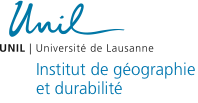Institute of Geography and Sustainability of the University of Lausanne
Research projects
Overtourism? Les villes comptent
| Research fields |
Urban matters Cultures and natures of tourism |
| Keywords |
Overtourism Quantification Statistics Big data Tourism |
| Funding | Lead Agency (FNS) |
| Duration | September 2021 - August 2025 |
| Website | https://wp.unil.ch/overtourism/en/ |
| Researchers |
Stock Mathis (Principal Investigator) [web] [email] Geffroy Valérian (Scientific collaborator) Ceccato Davide (Doctoral student) [web] [email] Bardet Fabrice (ENTPE) Cussó Roser (Université Paris I Panthéon-Sorbonne) Favero Giovanni (Università Ca'Foscari Venezia) Anduze Victor (ENTPE) |
In the current debate about overtourism in European cities, a controversy which could be further fueled by the role of human mobility in the Covid-19 crisis, the question how much is central. This controversy arises with the emergence, from 2015, of criticisms, resistances and protests against tourism among the inhabitants of several heavily touristic European cities, opposing the arguments and decisions of those who view tourism as beneficial or even necessary, especially for the economy, and support its promotion and reinforcement. In this debate, the statistical argument is frequently put forward. However, both sides struggle to match the political argument and the statistical argument, as the growth and hybridization of mobilities complicate the reading of tourism figures. Simultaneously, new statistical apparatuses emerge, with big data, digital footprints and cellphone tracking, creating new players and new services in the quantification domain. The Covid-19 crisis, where tourism is temporarily stopped, and where its benefits as well as its nuisances become spectacularly visible through their disappearance, is a particularly suitable moment to study the use of the statistical argument in the overtourism debate.
Aims
1. Observe the ways the statistical argument is used by cities and their citizens when addressing tourism, be it in arguing against overtourism or in favour of tourism and its development.
2. Test the hypothesis of the rise of new forms of touristic governance of cities (« smart cities » e.g.) related to the development of big data.
To do so, we study, on the one hand, the production of the statistical figures mobilized in controversies in four European cities, and on the other hand, the political uses of the statistical argument (for tourism growth? for the limitation or even degrowth of tourism? against mass tourism? against certain types of tourism? as an electoral argument?). As a byproduct, the project will provide an original mapping of tourism statistics sources, useful for the knowledge of the phenomenon and which could inspire producers and users of these figures.
Theory and disciplinary approach
From a theoretical point of view, two disciplines are put to work: the sociology of quantification, which studies the conventions and practices of turning social phenomena in numbers (“mise en nombre") and their political dimension in a constructivist epistemology (Desrosières, 2014); geography, which constructs touristic cites as an object of study, but also studies overtourism through the lens of the territorial relevance of quantification (neighbourhood, scale, area, etc.).
Case studies
- European cities: Venice, Lucerne, Paris, Lyon
- National statistics apparatuses: Italy, Switzerland, France
- International organizations: UNWTO, OECD, Eurostat, World Bank, WTTC, ETC, etc.

